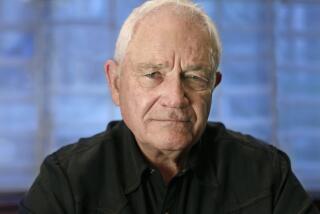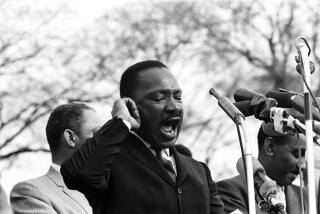How the Creation of a Monumental Work Came to Pass
- Share via
The King James Bible of 1611 and the works of Shakespeare are the chief pillars of the English language. For four centuries, to this very day, they have profoundly affected native-English speakers and how they write, think and feel. “In the Beginning” is an engrossing (and handsomely printed) account of the making of the King James Bible and its consequences.
Alister McGrath, professor of historical theology at Oxford, nicely puts the Bible in the religious and literary context of its time. By the time King James commanded it to be written in the early 1600s, Catholics and Protestants, followed by Anglicans and Puritans, had been contesting for the Christian soul of England for a century. After the Catholic party was put down when Queen Elizabeth I had the head of the Catholic Mary Queen of Scots chopped off, the contest was reduced to Anglican against Puritan.
Part of that struggle focused on the text of the Bible to be approved by the established Church of England. The Puritans were pressing hard for the Geneva Bible, produced in that city in 1560 by a group of English exiles. Under the influence of the French Protestant John Calvin, their text--and especially their annotated commentary, which offered Protestant interpretations--favored the Puritan attitude toward Christianity over the Anglican. The Puritan one was for extreme simplicity in worship, forswearing all traces of Catholicism such as bishops, ecclesiastical robes and the sign of the cross. The other, espousing the “Middle Way” it still cleaves to today, adopted those and other Catholic forms of ritual and governance while accepting Protestant theology.
James, who had been James VI of fiercely Protestant Scotland, succeeded Elizabeth as James I of England when she died in 1603. His succession emboldened the Puritans to believe that he might adopt the popular Geneva Bible as the version to be read in churches.
They misunderstood James. He greatly disliked the Scots Calvinist Presbyterians over whom he had ruled; he deplored their tendencies toward democracy. And he particularly disliked the Geneva Bible because it rejected the “divine right of kings,” to which James subscribed with fervor.
He was, though, anxious to uphold Elizabeth’s 1559 Settlement of Religion, which upheld the Church of England, and he wanted to quiet religious dissension. So in 1604 he convened a conference at Hampton Court Palace, from which emerged a command to create a new Bible to be translated by six teams of scholars from the original Hebrew and Greek. The translators deliberately built on the work of those who had gone before them, beginning with the translations encouraged by John Wycliffe in the late 14th century and followed by William Tyndale, Miles Coverdale and others.
Thus the work, McGrath believes, reflected not the English of 1611 but an earlier English. He writes that the archaic “ye,” “thou” and “thee” used in the King James version had probably largely gone out of fashion at the time of its printing. So, too, he thinks that the “th” ending for the third-person singular in the present tense--”he saith,” “she saith,” “he hath”--had already fallen into disuse at the time, and that, perhaps, readers of the printed language pronounced it with the modern ending--”he says,” “she says,” “he has”--when the text was read aloud.
The new Bible was greeted with “no fanfares of welcome or accolades of praise,” writes McGrath. But, especially after the restoration of the monarchy in 1660 following the collapse of Oliver Cromwell’s Puritan Commonwealth, it gradually came to be accepted matter-of-factly as the “real” Bible. Phrases from the King James Bible abound in everyday speech. McGrath especially points out a large number introduced from the Hebrew into English, including “to lick the dust,” “to fall flat on his face,” “a man after his own heart,” “under the sun,” “sour grapes,” “the skin of my teeth.”
Not until the late 18th and early 19th centuries did the familiar book--often the only book a family had in England and America--achieve its modern recognition as both a monument to the English language and a mighty molder of it. By then English nationalism, of which the powerful Bible was a symptom and a symbol, had created the British Empire and spread the King James Bible across the globe.
“Without the King James Bible,” McGrath writes, “there would have been no ‘Paradise Lost,’ no ‘Pilgrim’s Progress,’ no Handel’s ‘Messiah,’ no Negro spirituals and no Gettysburg Address. These and innumerable other works were inspired by the language of the Bible.” McGrath’s elegantly clear account is worthy of his great subject.
More to Read
Sign up for our Book Club newsletter
Get the latest news, events and more from the Los Angeles Times Book Club, and help us get L.A. reading and talking.
You may occasionally receive promotional content from the Los Angeles Times.









